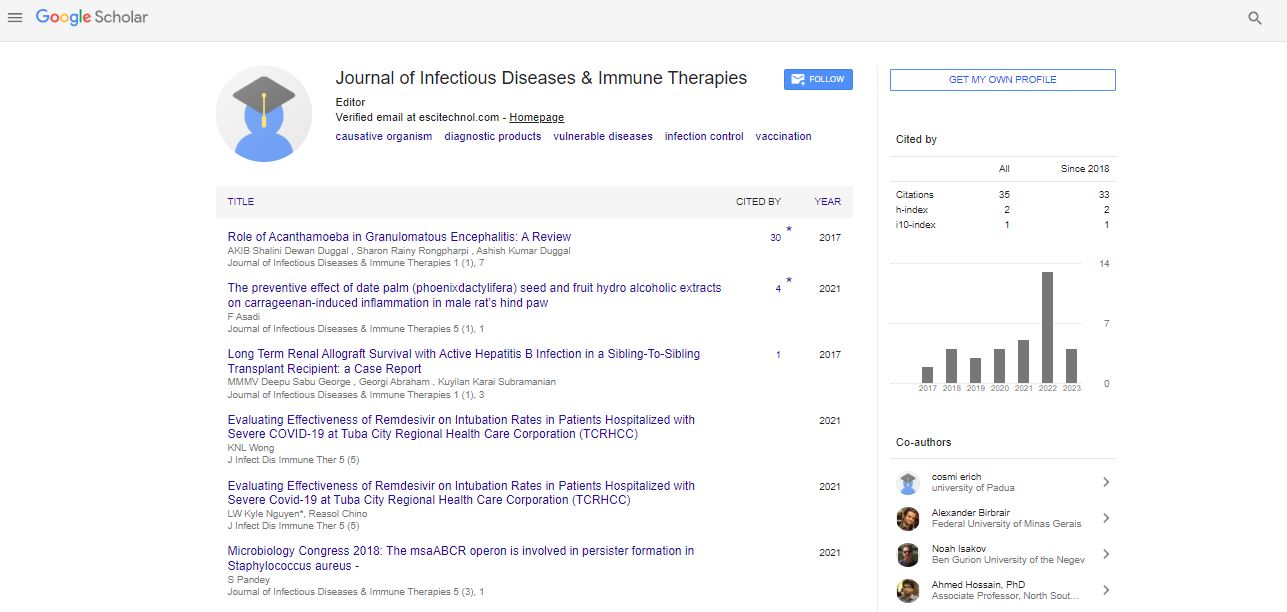Editorial, J Infect Dis Immune Ther Vol: 5 Issue: 4
Editorial Note on Immunotheraputics
Lucy Joris*
Department of Psychiatry, Campus Benjamin Franklin, Charité, Berlin 14050,Germany
*Corresponding Author: Joris L
Department of Psychiatry,
Campus Benjamin Franklin,
Charité,
Berlin 14050,
Germany,
E-mail: Lucy.joris@ gmail.com
Received: August 16, 2021 Accepted: August 30, 2021 Published: September 06, 2021
Citation: Joris L (2021) Editorial Note on Immunotheraputics. J Infect Dis Immune Ther 5: 4.
Keywords: Immunotherapeutics
Description
Immunotherapeutics have been demonstrated to be successful in making disease a controllable and reparable sickness in an expanding number of malignancies, however many difficulties remain. Obstruction is a significant to successful malignancy immunotherapy, and it tends to be isolated into three principle types: characteristic opposition, normally obtained obstruction, and treatment-prompted procured opposition. As a rule, the viability of the immunotherapeutic methodology depends on the capability of the host's insusceptible framework and the degree of tumor immunogenicity. Accordingly, it is hard to treat patients who have foundational invulnerable disappointment, like HIV and transplantation patients, and old individuals. A potential answer for these people is to move initiated tumor-explicit T- cells that can re-establish the antitumor host resistance utilizing autologous or allogeneic supportive T-cell treatment. Additionally, in any event, when there are an adequate number of equipped T- lymphocytes, tumors that don't contain powerful immunogens may not be perceived by the T cells. To beat this test, DNA-harming specialists, like chemotherapy and radiation treatment, can be utilized in blend with immunotherapies. This remedial system is expected to expand the quantity of changes, driving eventually to more immunogenic tumors and further developed patient outcomes.
Notwithstanding foundational safe disappointment, neighborhood resistant brokenness can likewise be seen in numerous disease patients. A non-inflammatory TME might bring about hindered resistant cell enlistment to the site of neoplastic injuries. Additionally, an immunosuppressive TME can impact the action of TILs, delivering them unfit to prompt antitumor safe reactions. For these cases, focusing on parts of the TME may assist with re-establishing the invulnerable framework's capacity to destroy the cancer. Other than inborn obstruction, normally procured opposition much of the time happens in malignant growth. For instance, under resistant choice tension, malignancy cells can dodge safe obliteration by consistently choosing disease cell populaces that are not so great, have impeded antigen handling and show capacity or have changes that might give the cells a development advantage. For instance, essential protection from the counter EGFR antibodies cetuximab and panitumumab has been accounted for in colorectal disease patients with actuating KRAS mutations. Another getaway procedure generally utilized by dangerous cells is the up regulation of safe designated spot proteins. These break systems might bring about disappointment of numerous immunotherapies. To switch this gained obstruction, mix treatment of insusceptible designated spot inhibitors with standard disease medicines or cell-based immunotherapies might be necessary.
As to customize disease immunotherapies, despite the fact that it is anticipated that restoratively focusing on TSAs can make malignant growth treatment more explicit, more powerful, and more secure, this methodology might have restricted translational achievement. One issue is that it isn't extremely clear whenever customized immunotherapy may prompt any immune system results. Likewise, it may not be feasible to finish the advancement of the treatment inside a clinically significant time period. Also, it includes the utilization of sequencing advancements, and accordingly, it might make numerous strategic difficulties, for instance, how to focus on potential tumorexplicit antigens for determination as treatment targets and how to accomplish profoundly precise sequencing results. In view of the intricacy of these issues, numerous malignant growth patients might have restricted or no admittance to customized immunotherapy until these issues has been effectively addressed.
Remedial malignant growth immunizations might have further developed adequacy when regulated before during the sickness course, maybe on the grounds that disease patients have lower tumor loads and more flawless invulnerable frameworks fit for getting more grounded insusceptible reactions against tumors. Malignancy immunotherapy-related poison levels are distinctive relying upon the kind of controlled treatment. The related manifestations can go from extremely gentle, like tingling and aggravation, to serious illness and even death. Cytokine treatment, including high-portion IL-2 treatment, is ordinarily connected with vague T-cell reactivity. The most wellknown symptom of IL-2 treatment is slender hole disorder, which is conceivably life-threatening. However, a new report announced a review examination of the results of 500 patients with metastatic renal cell carcinoma or melanoma treated with high-portion IL-2. In this examination, IL-2-intervened poison levels were reversible and the rate of lethal poisonousness was <1%. Conversely, different immunotherapies, including immunizations, CAR and TCR cell treatments, and designated spot inhibitors, may enact T cells all the more explicitly, causing explicit organ damage. Some malignant growth remedial antibodies, for example, rituximab and alemtuzumab have huge dangers for implantation responses (more than half each). Be that as it may, these responses are generally gentle. Just ~0.3% of treated patients can have genuine reactions.
 Spanish
Spanish  Chinese
Chinese  Russian
Russian  German
German  French
French  Japanese
Japanese  Portuguese
Portuguese  Hindi
Hindi 